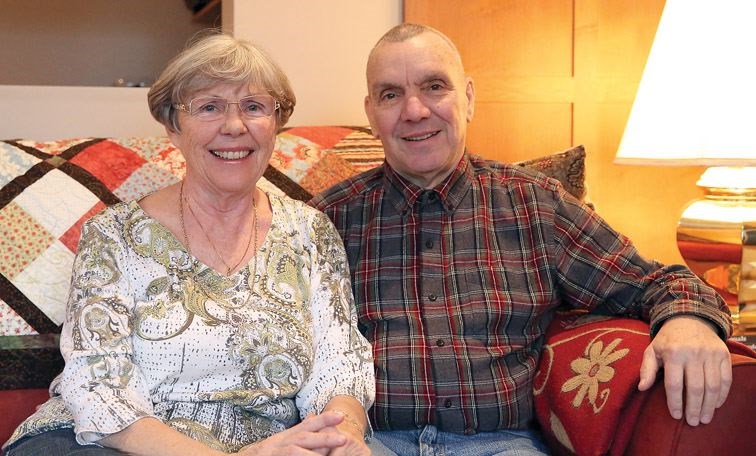A patient of the University Hospital of Northern B.C.'s geriatric unit is worried history is repeating itself.
Virginia Jenkins has been taking her husband Wayne, who has Alzheimer's, to
Dr. Eugene Okorie since the physician started at Northern Health's Geriatric Assessment and Treatment (GAT) Unit three years ago.
Before him, Wayne was treated by
Dr. Douglas Drummond, who left Northern Health in 2011 because of cuts to the day hospital program. He'd worked at the unit for seven years and served as director of the GAT unit.
Now Jenkins said Okorie is leaving for a position in Kelowna. When she last saw the geriatric psychiatrist on Feb. 23, she said Okorie told her his last appointment would be March 15.
"He was really surprised that I hadn't heard," said Jenkins, 72, who used to work as a registered nurse at the hospital.
"It's another loss," she said, especially for older patients. "These people can't speak for themselves and some of these people with Alzheimer's have older spouses than me that are just real tired of telling the story again. It's a real loss for the community."
Northern Health wouldn't say whether Okorie was leaving and calls to Okorie weren't returned.
"Physicians are private business people so we can't speak on their behalf about their current or future plans," said Northern Health spokesman Jonathon Dyck. "Once we receive formal resignation from a physician then that position is posted and then recruitment begins."
Dyck would not comment when asked if Northern Health had received Okorie's resignation or not.
A receptionist at the GAT unit told The Citizen last week that Dr. Okorie would be leaving for Kelowna at the end of March. Okorie has not responded to three requests for comment made during the last week. When The Citizen called back to confirm his last appointment day, staff said they could not comment.
Okorie was praised by several of his patients' wives for his care.
"I was very disappointed because I know someone like that is hard to replace. He cared. He was serious about helping," said Lynda Wagner, whose 69-year-old husband Barrie has both brain damage and dementia.
"(Okorie) was just very good. I think he's very tuned in to the person, the patient. He was wanting to do whatever he could to help us out."
The GAT unit is a combination of a five-day outpatient clinic and a geriatric day hospital, which operates Tuesdays and Thursdays from 9:30 a.m. to 2 p.m. - similar to the hours offered before Drummond left.
Back in 2005, when the 9,450-square-foot facility opened, Northern Health said "within a few months we hope to be operating five days a week in day care and seven days a week for in-patients," to address the growing seniors population.
"It's never been used the way it was intended to be used," said Jenkins. "Two days a week is not good enough."
When asked if Northern Health, in the last three years, had made plans to expand the day hospital or the GAT unit, Dyck referred to a UHNBC master planning process launched last year.
"Geriatrics is being explored as part of the master planning process, and we will have more information once the master planning process is complete."
Dyck couldn't say if recruitment had begun for that position or provide the number of physicians in Prince George who specialize in geriatrics.
Dyck said the group takes a team approach to care and the GAT unit is supported by several specialists including geriatric psychiatry, neurology, and geriatricians.
"We will continue to have these specialities available moving forward. The team around the patient would depend on the needs of that particular patient," he said.
Northern Health is already looking for at least one other doctor who works with seniors. Its job board has one recent posting for a permanent internal medicine doctor with a subspecialty in geriatrics for the GAT centre, who would be "expected to develop services and work with the existing service providers in a leadership role."
Lorna Dittmar, chair of the Prince George Council of Seniors advocacy, said it's important specialists are available.
"We have an aging community," said Dittmar, whose mother was treated by Drummond for Alzheimer's. "Often the (family doctors) don't really have the specifics of what Alzheimer's is. They don't understand."
When Drummond left, Roberta Kreitz said there was about a year gap in her husband Ray's care until Okorie arrived.
"There's a real need for a senior behavioural program or unit," said Kreitz, whose husband was diagnosed with Alzheimer's by Drummond in 2009.
"We are not happy with an idea that they are not putting in this senior unit and of course that Dr. Okorie is leaving us. He is a very well trained man."
Ray will next see Okorie on March 15. They heard of his departure at a support group.
"He's very accessible to us," said Kreitz, adding Okorie's departure will have an effect on her husband's care.
"It's going to change the situation because we don't have somebody of his stature to help us through these different phases in my husband's illness."
The fear expressed at her support group is that Okorie will be replaced with a general practitioner with "geriatric interests which certainly doesn't equate a geriatric psychiatrist."
Kreitz, who used to be a psychiatric nurse, said the specialized care is essential.
"It's just a very necessary service and they shouldn't deny us the opportunity to have someone of that quality."
After Drummond left in 2011, Jenkins wrote a letter to the editor.
"This service to the geriatric population should not be expected to function and thrive without an experienced doctor on site. This unit has provided consistency of care, and follow-up with the same staff of professionals, reducing the burden placed on family physicians or locums," she wrote.
With Okorie, she said "it's the same story. It's a slightly different reason."



